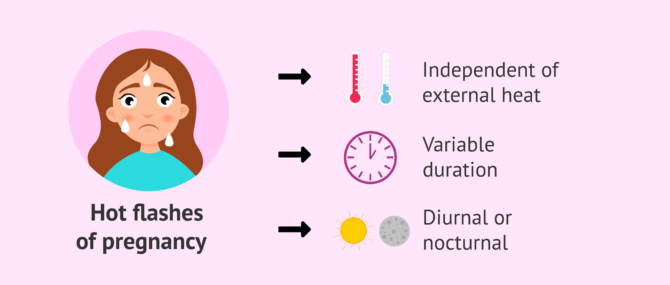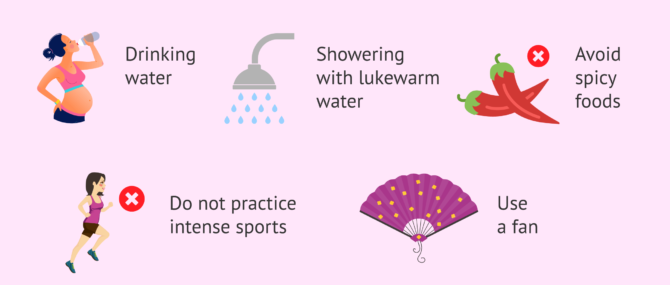Hot flashes are a fairly common discomfort that can occur during pregnancy. These hot flashes are a sudden heat that the pregnant woman feels, especially in the chest, head and neck, despite the fact that there are no high temperatures outside.
However, to alleviate the symptoms of pregnancy hot flashes, which can be increased by the summer heat, there are some recommendations that may be useful.
Provided below is an index with the 8 points we are going to expand on in this article.
- 1.
- 2.
- 2.1.
- 2.2.
- 3.
- 4.
- 5.
- 5.1.
- 5.2.
- 6.
- 7.
- 8.
What are hot flashes of pregnancy?
The so-called hot flashes of pregnancy are a sensation of heat that the pregnant woman suddenly notices, especially in the head, neck and chest. These hot flashes are unexpected, as they can occur even if the environment is not hot. However, the sensation can be even more uncomfortable in summer due to the high temperatures.
The duration of hot flashes can be variable, from a few seconds to a few minutes, and they can occur during the day or be nocturnal hot flashes, making it difficult for the pregnant woman to rest.
It is important to mention that, in principle, they have no negative effects on the baby. In any case, if the pregnant woman's temperature rises above 37.5-37.7oC, it is advisable to go to the doctor. In this way, it will be possible to evaluate if there is an infection that is causing fever.
In addition, if the temperature exceeds 39oC, you should go to the emergency room, as the pregnant woman may be suffering from heat stroke.
Why do hot flashes occur in pregnancy?
Hot flashes may appear as early as the first few weeks of pregnancy, but may occur throughout the pregnancy.
However, the causes of hot flashes appear to be different depending on whether the woman is at the beginning of pregnancy, or in the second or third trimester.
Hot flashes in the first trimester
Although the exact mechanism is not known, the occurrence of these hot flashes in the first trimester of pregnancy, as with hot flashes in menopause, is related to hormonal changes in women.
Temperature regulation is controlled so that the body temperature is maintained at around 37oC. However, hormones such as estrogens and progesterone can influence this control in the following ways:
- Estrogens: promote the dilation of blood vessels, which favors the dissipation of heat and, therefore, a lower body temperature.
- Progesterone: helps to maintain heat and increase body temperature.
Thus, maternal body temperature will rise a few tenths in the first trimester of pregnancy due to the influence of progesterone.
Hot flashes in the second and third trimester
Once gestation is more advanced, the causes of hot flashes are more related to the weight that the pregnant woman has gained and the changes that occur in her body due to the size of the baby at the end of pregnancy.
In addition, there is an increase in the metabolic rate, since there is a new being gestating.
As a result, maternal body temperature rises. For this reason, it is very common for women in the last weeks of pregnancy to feel, in general, more suffocated and even have the perception of a certain sensation of suffocation.
How to combat hot flashes during pregnancy?
Hot flashes in pregnancy are quite annoying, as they can even make it difficult for the mother-to-be to rest. However, there are some recommendations to try to reduce its occurrence or, at least, alleviate the symptoms of overheating:
- Drink enough water to maintain good hydration. For this purpose, it will be very useful to have a bottle of water always at hand.
- Shower with lukewarm water.
- Wear loose-fitting, lightweight, breathable (e.g., cotton), light-colored clothing. To reduce the sensation of being overwhelmed, it is best to avoid tight-fitting, synthetic clothing.
- Do not eat spicy foods. It is preferable for the pregnant woman to include fruits in her diet, which will also contribute to hydration.
- Do not practice strenuous physical exercise.
- Keep spaces well ventilated.
- Have a fan and a spray bottle with water ready to cool off during hot flashes.
In addition, it will be important for the pregnant woman to always seek shade and avoid going out during the hottest hours of the day.
Warm feet's Syndrome
Hot feet syndrome may also be common in pregnant women. It is pain and a sensation of heat, burning or stinging in the feet, especially in the soles and toes.
In this case, hot feet syndrome in pregnant women seems to be more related to fluid retention and poor circulation.
To alleviate the symptoms of this syndrome, a massage before going to bed may help, as well as wearing comfortable, flat shoes.
FAQs from users
Are hot flashes a symptom of pregnancy or a sign that my period is about to start?
Although it is true that hot flashes can be a symptom of pregnancy, it is necessary to perform a pregnancy test to confirm or rule out pregnancy.
In the days before menstruation, especially if the woman has had sexual intercourse without contraceptive protection and does not want pregnancy, it is possible to confuse certain premenstrual symptoms and interpret them as symptoms of pregnancy due to anxiety.
Therefore, the best thing to do is to wait to see if the menstrual period comes off or if, on the contrary, there is a menstrual delay. In the event that menstruation is delayed, it is advisable to take a pregnancy test to find out for sure.
Are hot flashes due to pregnancy or menopause?
A woman noticing hot flashes or hot flashes may indicate pregnancy or approaching menopause (the cessation of menstrual cycles). The reason is that the hormonal changes that occur in both situations can lead to the onset of hot flashes.
Therefore, if sexual intercourse has taken place without contraceptive protection, it is best to wait to see if there is a delay in menstruation and perform a pregnancy test.
A positive result confirms pregnancy, while a negative result makes it advisable to see a specialist to find out the causes of the menstrual delay and hot flashes, especially if the woman is young.
Suggested for you
If you want to learn more about health in pregnancy, you can read the following article: Health in pregnancy: nutrition, care and possible problems.
On the other hand, if you want to know more about other possible common discomforts in pregnancy, we recommend you to visit this link: Common aches and pains during pregnancy.
We make a great effort to provide you with the highest quality information.
🙏 Please share this article if you liked it. 💜💜 You help us continue!
References
Barnes JN, Charkoudian N. Integrative cardiovascular control in women: Regulation of blood pressure, body temperature, and cerebrovascular responsiveness. FASEB J. 2021 Feb;35(2):e21143. (See)
Charkoudian N, Hart ECJ, Barnes JN, Joyner MJ. Autonomic control of body temperature and blood pressure: influences of female sex hormones. Clin Auton Res. 2017 Jun;27(3):149-155. (See)
Charkoudian N, Stachenfeld N. Sex hormone effects on autonomic mechanisms of thermoregulation in humans. Auton Neurosci. 2016 Apr;196:75-80. (See)
Charkoudian N, Stachenfeld NS. Reproductive hormone influences on thermoregulation in women. Compr Physiol. 2014 Apr;4(2):793-804. (See)
Cortés YI, Conant R, Catov JM, Matthews KA, Crawford SL, Hedderson MM, Thurston RC. Impact of nulliparity, hypertensive disorders of pregnancy, and gestational diabetes on vasomotor symptoms in midlife women. Menopause. 2020 Dec;27(12):1363-1370. (See)
Hartgill TW, Bergersen TK, Pirhonen J. Core body temperature and the thermoneutral zone: a longitudinal study of normal human pregnancy. Acta Physiol (Oxf). 2011 Apr;201(4):467-74. (See)
FAQs from users: 'Are hot flashes a symptom of pregnancy or a sign that my period is about to start?' and 'Are hot flashes due to pregnancy or menopause?'.





